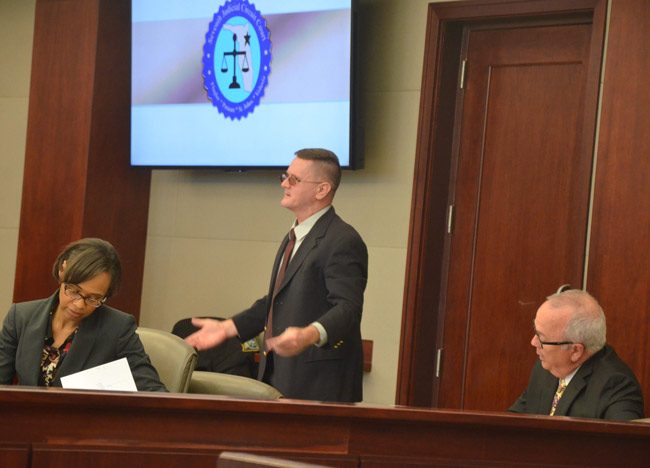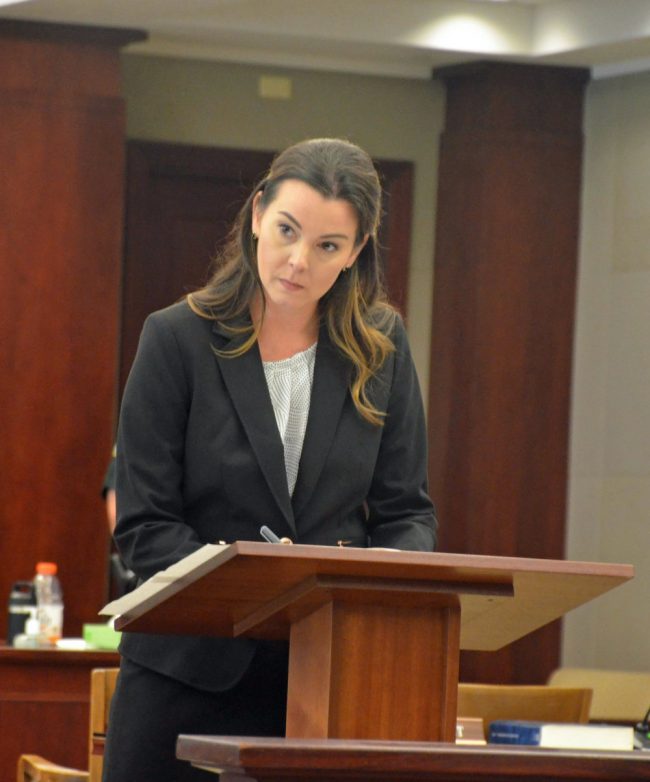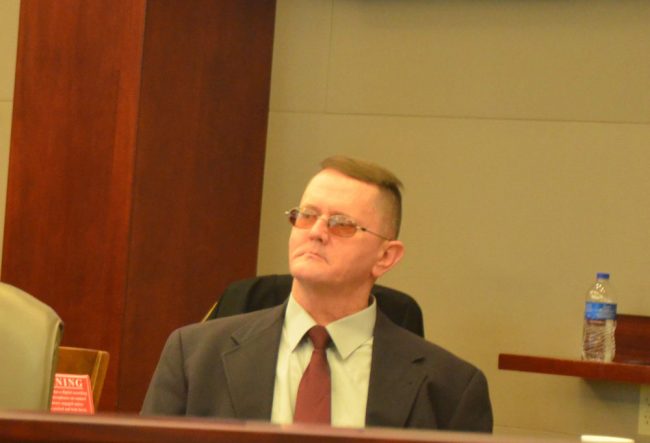
(© FlaglerLive)
Is assisted suicide any less of a crime if the person assisting in the killing also attempted to die as part of a double-suicide pact, but failed? That’s one of the questions at the center of a trial that began today in Flagler County circuit court.
If Bruce Haughton had arranged for his girlfriend, Katherine Goddard, to die by carbon monoxide poisoning, helping her prepare and seal the garage, then walked out once the car started belching exhaust, his case would have been relatively straight-forward: assisted suicide is illegal in Florida. It’s a second-degree felony. That’s the way Michigan physician Jack Kevorkian helped some patients die before his trial, conviction and eight-year imprisonment on the same charge Haughton faces today.
But that’s not what Haughton did, according to what he told police. He and Goddard had a suicide pact. It didn’t work as planned. When a sheriff’s deputy arrived at the house at 29 Red Clover Lane in Palm Coast, he found the scene as Goddard’s daughter had: both Haughton and Goddard were in a Ford Escort in the garage–Haughton in the driver’s seat, Goddard in the passenger seat. Goddard, 52, had died from apparent carbon monoxide poisoning. Haughton, also 52 then, had a pulse. He was breathing.
That it had been a planned double-suicide–at least according to Haughton–didn’t matter. His failure to die was a crime: He was charged with assisted suicide, which in Florida is called “assisted self-murder.”
Haughton was booked at the Flagler County jail on August 16, 2017, on $100,000 bond: he’s poor, he was homeless but for Goddard’s help: when a deputy followed up on the investigation, he had to meet Houghton at Rymfire Park, because Haughton didn’t have a place of his own. He has no extended support. Last December he argued in court through his lawyer that the the attempted double-suicide was the result of diminished mental capacity. He wasn’t insane, but he wasn’t right in the head. Goddard’s daughter had told a deputy that her mother and Haughton had been cut off from their pain pills for two weeks before the double-suicide attempt. The judge didn’t accept that defense. In Florida, a defendant may either argue insanity or not. There’s no in-between.
Nevertheless, Houghton’s is one of the most unusual cases to come before the court in Flagler–or anywhere in Florida. Case law is thin. It’s not as if the prosecution could argue that Houghton had never intended to die, and that it was all a ruse to get rid of Goddard: the state’s own charge doesn’t support the claim.
Haughton’s trial began with jury selection today. The challenge for Assistant State Attorney Jennifer Dunton, who is prosecuting the case, was to find six jurors and an alternate who could apply the law despite whatever sympathies they may have with people in Haughton’s situation or because of personal experiences. The challenge for Assistant Public Defender Rose Marie Peoples, who is defending Haughton with Matt Phillips, was to find jurors who would not outright condemn a man for even attempting suicide, let alone helping that of another.
As the daylong jury-selection process wore on, it became clear to what extent suicide pervades ordinary lives no matter the background, the age, the race, the religion–and to what extent most people’s feelings and opinions about suicide are conflicted. When the prosecutor asked how many people had had personal experiences with suicide, nine out of the 40 people in the jury pool spoke of deaths to friends, parents, colleagues.
One woman spoke of attempting to end her own life. She spoke so softly that the jror next to her had to specify to the court in a louder voice: “She said she tried herself.” It was 18 years ago. But when Dunton asked her if she could sit through trial and objectively look at photographs and hear evidence, the woman said: “I don’t know how it relates. I think it’s two different things.” (She did not make it on the jury).

One man agreed with three jurors who had spoken before him: “I’ve had relatives who were at the end, there was no cure, it was, you know, they were suffering, and if you watched somebody in that condition,” he said, “doctors are just like lawyers or concrete people or race car drivers, anything. Some of them are better than others, and some of these doctors have different opinions on how they treat these patients.” He said he spoke from some level of experience: His wife is an ICU nurse, where such insights are frequent. Another member of the jury pool works in hospice, where he said those life and death issues are a constant.
“It all depends on the circumstances. If it’s really bad, maybe,” another juror said.
The level of empathy may suggest why the prosecutor spent more time than the defense prodding jurors, looking for the sort of man or woman who would more strictly apply the law with less room for personal experiences or raw sympathies.
Dunton repeatedly tried to swing the scenario back from those more empathetic circumstances. Little by little she became more specific about the scenario of a suicide pact that half fails, one involving people who aren’t terminally ill but who have mental health issues: they’re giving up on life. (The lawyers aren’t allowed to speak of the specifics of the case at this stage. In Goddard’s case, her daughter had told authorities she was bi-polar. Goddard and Haughton had planned to move to New Hampshire to live with Goddard’s parents but the parents wouldn’t accept Haughton. According to Haughton, they agreed to die together–to just end it. .
But even then, jurors’ empathy or reluctance to judge was heard more frequently than more emphatic answers. “I think to each his own,” a woman said. “Why anyone would want to assist is beyond me but again it would depend on the circumstances.”
“I don’t necessarily agree with it, I would need to know why they would want to assist,” a juror said. “Are they just buying the gun or are they actually pulling the trigger?”
But the emphatic wasn’t absent: “Probably never,” a man said in answer to when an assisted suicide scenario would be acceptable. “I believe we’re created in God’s image, he kind of decides when and where.” Several jurors–albeit a minority–took that line of thinking to one degree or another, though those who did, with one exception, did so with no hesitancy, no conflict: it was a matter of inviolable belief. The one exception was a woman who felt just as strongly about the sanctity of life as she did about her inability–and unwillingness–to impose that belief on others, to the point that she said she could not sit in judgment of anyone for that reason. She was excused.
And the more jurors spoke, the more those who still had to speak confessed to being made even more conflicted from what they were hearing.

But a jury pool’s sympathy quotient in what ultimately amounts to a vacuum of evidence and a chamber of assumptions can be very deceptive. Three years ago, Anna Pehota, who was 75 at the time, had jurors all mollified at the beginning of her murder trial. She’d shot her husband. Jury selection was rife with questions of sympathy with women driven to the verge of nervous breakdowns by their boorish husbands. Pehota built on that sympathy with her description of the killing and its circumstances as “a hair between sanity and insanity.” But when the prosecution showed the video of Pehota’s three-hour interview with a detective, she herself demolished the sympathy she’d garnered, coming across as a more of a deliberate killer than the more prototypical grandmother she’d appeared to be until then. The jury found her guilty and she was sentenced to life in prison.
The prosecutor in the Pehota case? Jennifer Dunton.
It was past 4 p.m. today when a jury of five women and two men, all white, had been seated. Judge Chris France, usually the family court judge, had presided over the proceedings in place of Judge Terence Perkins, who was teaching in Tallahassee. Perkins was due back by Tuesday morning, when the two sides make their opening arguments starting at 9 a.m. in Courtroom 401 at the Flagler County courthouse.
Throughout, Houghton had spent the selection process directly engaged between his two lawyers, listening to every word, observing jurors’ body language, and seeming to whittle down jurors with his lawyers. On two occasions, when a juror was individually excused (out of view of the rest, but in the open courtroom), Haughton–unusually for a defendant–uttered audible “Thank you”s as the jurors walked out. During a break, he seemed eager to speak as Peoples spoke to a reporter, but Peoples urged him not to. As he stood, both his hands trembled a bit as he tried to steady them by wrapping a finger or two around the buttons of his suit jacket.
![]()
Suicide Town Hall: On May 23, Flagler Lifeline, a volunteer committee and Flagler Cares affiliate established to broaden conversation and awareness of suicide, will host a public town hall event at 6 p.m. at the Flagler County Association of Realtors building, 4101 East Moody Blvd. in Bunnell. The Town Hall will feature presentations by mental health experts, suicide survivors and others who have been touched by suicide, and will be facilitated by Colleen Conklin, the long-time school board member and one of Flagler Lifeline’s founders. For the past several years Conklin has hosted periodic events, including electronic town halls, to bring awareness to bullying and suicide prevention. The May 23 town hall, like Flagler Lifeline’s emergence, is partly a result of Flagler County’s place in 2017 as the county with the leading suicide rate in the state, proportional to its population. See the background story here.





























haw creek girl says
I grew up with Bruce. He’s not a bad guy. I do believe he meant to die. It’s a 2nd degree felony so he’s going to do some time if convicted. Sadly, a life wasted….Bruce was smart & gregarious in his younger years. Reach out to those around you before it gets to this point! And the Doctors had them both addicted to pain meds and then took them off…they should feel some of the blame.
Diesel says
Flagler Courts will probably give him Life In Prison,
instead of being Gracious by giving him the Death Penalty.
~ wouldn’t THAT be Ironic (yet: Typical)!
Robert Rivas says
Just a correction, in the case in which Jack Kevorkian was convicted and sentenced to prison, it was not for “assisting in a suicide.” This story says Kevorkian “helped some patients die before his trial, conviction and eight-year imprisonment on the same charge Haughton faces today.” It is true that Kevorkian helped many terminally ill, imminently dying people to terminate their suffering, and also that he was charged with assisting in a suicide a number of times. Each time he made the prosecution look foolish because he put on evidence of the dying person’s suffering and the jury acquitted him. But in the final trial that led to his imprisonment, he was charged with second degree murder — not assisting in a suicide. It made all the difference because the nature of the charge made it irrelevant whether the subject was suffering. Kevorkian was finally convicted because he couldn’t obtain the jury’s support and sympathy.